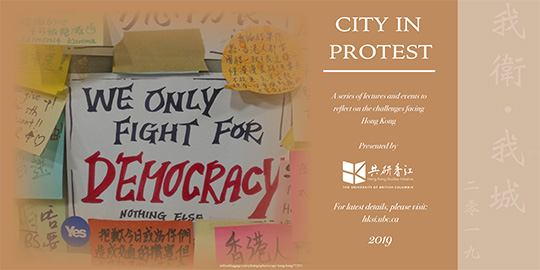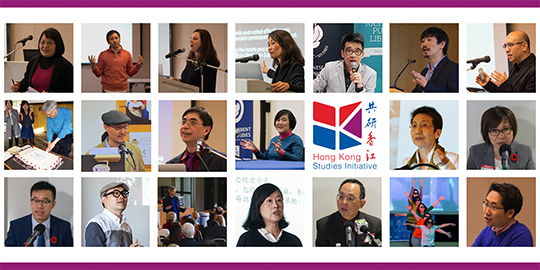|
Dear Friends of HKSI, It has been an extraordinarily busy start of a term. Please check out our forthcoming October events and join us if you can. Leo K. Shin 單國鉞 |
|
||
 |
||
|
The UBC Hong Kong Studies Initiative announces the launch of “City in Protest,” a series of lectures, conversations, and events to help us reflect on the challenges facing Hong Kong. Please follow us on social media or check out our website from time to time as more events will be added to the program. |
||
|
||
 |
||
|
Public Lecture A City in Protest event This talk examines Cold War borderscapes and cinematic expression in colonial Hong Kong. Whereas an ideological fortress separated leftist and rightist organizations and partisans, the frontier between the People’s Republic of China and colonial Hong Kong was an unsettled space of contestation in the early 1950s. The border was itself a space of physical confrontation, kidnapping, and armed conflict between British and Chinese troops. The massive "illegal" influx of Chinese refugees from the mainland into Hong Kong was referred to by the US as "refugees from the Free World." Numerous destructive fires in the squatter settlements alarmed the US and PRC governments sufficiently to send humanitarian aid to the colony. Meanwhile, colonial officials refused entry to Hong Kong to PRC "comfort delegations" which sought to visit fire-struck, homeless people, in turn provoking riots in the border regions. Conspiracy and paranoia reigned in the government’s anti-communist measures in social and cultural fields, and this saw the swift deportation of mainland film workers together with protest leaders of fire victims in 1952. The talk asks how borderscapes and social crises structure film narratives and frame cinematic imagination. The notion of borderscape relates not only to socially produced and constantly redefined territorial borders in their Cold War connections, but it also emphasizes the malleable boundaries of texts, artefacts, discourses, and imaginaries that are challenging what is socially and culturally prohibited, regulated, or artistically negotiated on political allegiance and individual identity politics. The second part of the talk will discuss the Mandarin-speaking film Halfway Down [Ban xialiu shehui] (1957) produced by American-financed Asia Pictures in the "rightwing" camp, which narrates the plights of exiled intellectuals fleeing their mainland homes to sojourn in a ghetto in colonial Hong Kong. Regardless of the ideological orientations, the film was a tenement drama about migrants and exiles seeking moral reformation and collective union. While the movie was being made in 1956, the Kowloon riots erupted during Double Ten Day (October 10) as ignited by escalating provocations between pro-Nationalist and pro-Communist factions in the city, forcing British armored troops to intrude and quell the rioting, which led to 59 deaths including Europeans and Chinese. Within the regulative frame of Cold War politics, this paper asks, can the film move beyond political allegory to global storytelling of diasporic Chinese subjects and communities? Can it provide a possibility of border-thinking to counteract nationalism and political propaganda? How do refugees and exiles mobilize storytelling and images to contest the meaning of being Chinese? Kenny K. K. Ng 吳國坤, Associate Professor in the Academy of Film at the Hong Kong Baptist University, obtained his Doctoral Degree (East Asian Languages and Civilizations) from Harvard University. He teaches comparative literature, film studies, visual culture, and Hong Kong cinema. His first book, titled The Lost Geopoetic Horizon of Li Jieren: The Crisis of Writing Chengdu in Revolutionary China, was published by Brill in 2015. He has published widely on film culture and modern Chinese cultural and literary studies in the U.S., UK and Europe, China, Taiwan, and Hong Kong. His ongoing research book projects concern censorship and visual cultural politics in Cold War China and Asia, and a critical history of Cantophone cinema. This public lecture is co-sponsored by the Department of Asian Studies, Centre for Chinese Research, and Hong Kong Studies Initiative. |
||
|
|
||
 |
||
|
Public Lecture An Interdisciplinary Histories Research Cluster Keynote Lecture Free and open to the public In this talk, Prof. Laikwan Pang will discuss the global meanings of Hong Kong’s democratic project. Inspired by David Harvey’s call for the right to the city, she will explore how Hong Kong has been both a polis and a refugee city as well as how we can learn from this history to respond to the recent political events both in the city and across the world. In this talk, Prof. Pang will argue that the kind of political autonomy that Hong Kong needs is one that could continue to maintain its liberalism and progressiveness, be receptive to people and ideas from China and all over the world, and at the same time be committed to the continual development of its civil society and its cultural identity. Prof. Laikwan Pang 彭麗君 received her Ph.D. in Comparative Literature from Washington University in St. Louis and has taught at the Chinese University of Hong Kong since 2002. Her research interests include film studies, visual studies, creativity, aesthetics, as well as cultural and political theories. Among her publications are: Building a New China in Cinema (2002), Cultural Control and Globalization in Asia (2006), Distorting Mirror (2007), Creativity and Its Discontents (2012), and The Art of Cloning (2017). Her forthcoming book, The Appearing Demos: Hong Kong During and After the Umbrella Movement (2020), will discuss the recent dissident movements in Hong Kong from both a global perspective and a cultural perspective. This public lecture is organized by the Hong Kong Studies Initiative and is generously sponsored by the Interdisciplinary Histories Research Cluster, St. John’s College, Department of Asian Studies, Department of History, Department of Geography, and Centre for Chinese Research. |
||
|
||
 |
||
|
Communal Screening「談天說戲」放映會 “The most renowned and feared chef in the world loses his title of God of Cookery because of his pompous attitude. Humbled, he sets out to reclaim his title.” This communal screening is sponsored by the Hong Kong Studies Initiative, Department of Asian Studies, Department of History, and Centre for Chinese Research. (Fans of Hong Kong cinema may also want to check out the following two offerings from this year’s Vancouver International Film Festival: Still Human and No. 7 Cherry Lane.) |
|
||
 |
||
|
Public Lecture RSVP: http://www.sfu.ca/davidlamcentre/events/Urban-Media-Art.html Interest in urban media art has been on the rise over the last decade. The form has been used in art festivals such as Lumiere Vancouver and Lumiere Hong Kong as large-scale spectacles and tourism promotion campaigns. A critical question is whether they actually contribute to the urban environment or only add another layer of gloss over the city’s façade as “urban cosmetics.” This lecture will use the emerging discourse on urban media as its point of departure and contextualise it with the situation of Hong Kong. In a city known for its sensory overload, can urban media art take an alternative path? Kingsley Ng is an assistant professor in Academy of Visual Arts at Hong Kong Baptist University. He is an inter-disciplinary artist and designer with a focus on site-specific and participatory projects. His creative practices are driven by a belief that art can be socially relevant and transformative. Recent projects include Twenty-Five Minutes Older, a commission by Art Basel which takes the audience on a camera obscura moving tram, and After the Deluge, presented in an underground storm-water tank the size of 40 Olympic-sized swimming pools. This public lecture is co-sponsored by SFU International, David See-chai Lam Centre, and Institute for Transpacific Cultural Research.
|
||
 |
||
|
Cantonese Opera Artistic Workshop This workshop will be composed of three parts, starting with a brief introduction to Cantonese opera for people who know nothing about Cantonese opera. The main workshop will then focus on the special features and key building blocks which explain how improvisation works in Cantonese opera. There will be demonstration of some of the recognizable paai-ji music and paai-cheung acts to illustrate the desired dramatic effects in the operatic show. The last part of the workshop will drill down to the intricacies of writing the lyrics for the 2nd Global Cantonese Opera Song-writing Contest. Translation into English will be minimal for this part of the workshop, as this last segment is meant for people with sufficient proficiency in Cantonese and some technical knowledge of Cantonese operatic music. There will be time for Q & A in English & Cantonese. This workshop is co-organized by the U Sing Cantonese Opera Pavilion and the Pacific Canada Heritage Centre-Museum of Migration Society. |
|
||
|
September 20: Barrister Randy Shek reflected on the challenges of being a human rights lawyer in Hong Kong (photos) and offered his observations of the transformations of the Hong Kong Police Force (photos) during his visit to UBC. September 22: Barrister Randy Shek spoke to many a concerned member of the community about the state of human rights in Hong Kong (photos). September 25: HKSI Associates Dr. Paul Evans and Dr. Leo K. Shin wre joined by some sixty students and members of the UBC community for a panel discussion (hosted by the International Relations Student Association) on the current crisis in Hong Kong. September 26: Prof. Ho-fung Hung of The Johns Hopkins University reflected on the role of Hong Kong in the development of Chinese state capitalism in a lecture jointly organized by the David Lam Centre (SFU), the School for International Studies (SFU), and the Hong Kong Studies Initiative (UBC). September 28: Singer-songwriter and activist Anthony Wong spoke with Dr. Helen Leung (SFU) in front of a packed audience about his long music career, his experience being an openly gay artist, and the intersection between arts and politics in Hong Kong (webcast | photos). |
 |
|
Please kindly consider a tax-deductible donation to HKSI (hksi.ubc.ca/support-us). Thank you, as always, for your support of the UBC Hong Kong Studies Initiative. |
|
||||
| This email is intended for lshin67@gmail.com. Unsubscribe |
